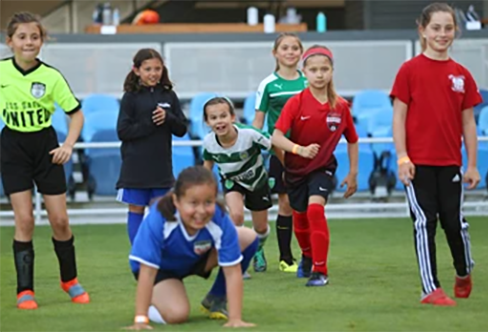JED Foundation Webinar Recap – Athletes Mental Health: The Role of Sports in a Young Person’s Life
05.26.22
On Thursday, May 26th, 2022 Positive Coaching Alliance, in collaboration with the Jed Foundation, hosted a webinar, Athletes & Mental Health: The Role of Sports in a Young Person’s Life. The conversation was moderated by PCA’s Courtney Pollack and a panel including former San Francisco Giants player Drew Robinson, San Francisco Giants Director of Employee Assistance Program Shana Alexander, and the Jed Foundation Senior Clinical Director Suzanne Button.
The discussion focused on how parents and coaches of youth and high school athletes can work to create the best possible environment for youth to thrive, as well as how to identify someone who is struggling with mental health, and how to help them.
Suzanne began by explaining many of the positives of youth sports and evidence to suggest that a successful youth sports experience can:
- lower levels of stress and anxiety
- decrease substance abuse
- increase youth resilience
- create a sense of agency and mastery
- boost confidence
- elevate empathy levels

Shana discussed that to unlock this potential, the proper positive environment must be created and the important role parents play. For example, parents need to monitor how they react to their child’s good or bad performance, make a distinction between effort and performance, and emphasize that success is not based on the actual performance, but the effort and willingness to help their team. One idea she mentioned was to ask your child about their own personal goals, as they are much more important and motivating than larger goals set by the team or the parent themselves. Once a suitable environment for indulging emotions and creating personal growth is sustained, the parent can move into deeper topics, such as helping their child learn how to fail.
The panel then moved on to address how to determine if somebody is at risk of ending their own life despite not showing clear signs. Shana emphasized that everyone should feel open and comfortable talking about mental health, and that people looking for risk in others should be very direct about their questioning and know it is okay to ask “are you feeling like ending your own life?”.
Drew brought some of his own experiences with risk to the conversation, explaining that in order for high risk, low warning athletes such as himself to get help, they need to come out and explain their problems on their own. He believes the best way to motivate people to talk about their own mental health, is to first reduce the negative stigma around dealing with mental health. He brought up the concept of creating an environment where athletes feel as confident bragging about mental health as they do their physical strength, saying “If you would brag about a 5-mile run in the morning, you should also brag about going to therapy in the morning”.
Courtney then led the conversation into the more individual and reflective topic of Growth vs. Fixed mindset. Drew talked about his experience with the ‘comparison trap’ and how chasing a false sense of control and accomplishment for things he may not be able to affect, left him unable to focus on improvement. He talked about how life is about continuous learning, continuous improvement, and the journey to the top; not the actual goal itself.
The panel went on to take questions from the chat with most of the answers focused on how to be a good role model, and help athletes feel comfortable taking on new experiences and challenges regarding their mental health. Shana talked about how Gabe Kapler, the manager of the San Francisco Giants, began the first day of spring training with a mental health talk, and told the team about his own battles with mental health in sports.
The panel ended by talking about how creating a healthy environment for mental health discussion will not always be an easy task, and that all parties involved need to understand that they directly impact every aspect of the conversation. We are all in this together.